
- Shandong Loyal Industrial Co.,Ltd.
- SHORT-CUT PASTA PRODUCTION LINE LONG-CUT PASTA PRODUCTION LINE INSTANT PASTA PRODUCTION LINE
Home> Application> Revolutionizing the Industry: Full Automation Strategies Propel Pasta Manufacturing Companies towards Unmatched Efficiency and Energy Savings

Revolutionizing the Industry: Full Automation Strategies Propel Pasta Manufacturing Companies towards Unmatched Efficiency and Energy Savings
Revolutionizing the Industry: Full Automation Strategies Propel Pasta Manufacturing Companies towards Unmatched Efficiency and Energy Savings
In the dynamic landscape of pasta processing equipment, the relentless pursuit of efficiency and energy savings has become paramount. Pasta manufacturing companies, including industry giants like Barilla, De Cecco, Creamette, San Giorgio, and Great Value, are embracing a transformative shift towards full automation. This evolution signifies a monumental leap in the industry's capabilities, promising unparalleled efficiency and significant energy conservation.Shandong Loyal Industrial Co., Ltd. has incorporated advanced technologies from Tecalit and Lineapasta in the production of its macaroni.

Full Automation in Pasta Manufacturing Companies
The current scenario in pasta manufacturing is witnessing a paradigm shift, with companies recognizing the potential of full automation. Barilla, De Cecco, Creamette, San Giorgio, and Great Value are leading the charge by integrating state-of-the-art technologies into their production processes. Automated systems are becoming integral to streamline operations, enhance precision, and elevate overall productivity.
Pasta manufacturing companies are investing heavily in cutting-edge technologies, including robotic arms, advanced conveyors, and AI-driven quality control systems. These technologies are seamlessly integrated into the production line, allowing for a comprehensive and efficient manufacturing process. The goal is to achieve a fully automated production cycle, from raw material handling to packaging.
The adoption of full automation brings forth numerous benefits, such as increased production speed, consistent product quality, and reduced operational costs. However, challenges exist, including the initial investment and the need for skilled personnel to manage and maintain automated systems. Despite the challenges, the potential long-term gains far outweigh the initial hurdles.
Strategies for Unmatched Efficiency
Full automation enables pasta manufacturing companies to streamline their production processes, minimizing bottlenecks and optimizing workflow. This strategic approach enhances efficiency by ensuring a continuous and synchronized production line. Barilla, De Cecco, Creamette, San Giorgio, and Great Value are leveraging automation to achieve a seamless and efficient pasta production cycle.
Precision and quality control are paramount in pasta manufacturing. Automated systems offer a level of precision that is challenging to achieve manually. Advanced technologies monitor and control various parameters, ensuring each batch meets the highest quality standards. This commitment to precision is a cornerstone in the strategies employed by leading pasta manufacturing companies.
The incorporation of advanced technologies, such as machine learning and real-time data analytics, plays a pivotal role in enhancing efficiency. These technologies enable predictive maintenance, minimizing downtime and optimizing resource utilization. Barilla, De Cecco, Creamette, San Giorgio, and Great Value are at the forefront of leveraging these advancements to ensure unmatched efficiency in their operations.

Energy Savings in Pasta Manufacturing
Pasta manufacturing companies are not only focusing on efficiency but also on sustainable practices. Full automation allows for the implementation of eco-friendly initiatives, such as energy-efficient machinery and waste reduction measures. Barilla, De Cecco, Creamette, San Giorgio, and Great Value are actively incorporating these sustainable practices to minimize their environmental footprint.
The environmental impact of pasta manufacturing is a growing concern. Full automation contributes to a reduction in energy consumption and waste generation. By optimizing production processes and implementing energy-efficient technologies, pasta manufacturing companies are aligning their operations with environmentally conscious practices. This strategic shift is vital for the long-term sustainability of the industry.
Leading pasta manufacturing companies are investing in the development and implementation of energy-efficient equipment. From energy-efficient drying systems to smart packaging solutions, innovations are geared towards minimizing energy consumption. These companies understand the importance of embracing technological advancements that not only boost efficiency but also contribute to overall energy savings.
Case Studies of Successful Implementation
Barilla, De Cecco, Creamette, San Giorgio, and Great Value stand as prime examples of pasta manufacturing companies that have successfully embraced full automation. Case studies will delve into the specifics of their implementations, highlighting the challenges faced, solutions employed, and the tangible results achieved in terms of efficiency gains and energy conservation.
Examining real-world examples will provide insights into the quantifiable benefits reaped by pasta manufacturing companies through full automation. Metrics such as increased production output, reduced energy consumption, and improved product quality will be explored. These success stories serve as inspiration and benchmarks for others in the industry.
Drawing from the experiences of Barilla, De Cecco, Creamette, San Giorgio, and Great Value, this section will outline the lessons learned during the transition to full automation. Best practices will be identified, offering guidance to other pasta manufacturing companies considering a similar transformative journey. The collective wisdom gained from these industry leaders contributes to the evolution of best practices in pasta manufacturing.
Future Outlook and Trends
As technology continues to advance, the future of full automation in pasta manufacturing appears promising. This section will explore anticipated developments, including the integration of artificial intelligence, predictive analytics, and robotics. Insights into ongoing research and development initiatives will shed light on the trajectory of the industry towards even greater automation.
Pasta manufacturing companies are at the forefront of adopting emerging technologies. From automated recipe adjustments based on real-time data to smart logistics systems, this section will delve into the technologies that are reshaping the pasta manufacturing landscape. Barilla, De Cecco, Creamette, San Giorgio, and Great Value's commitment to staying ahead of the curve will be highlighted.
The widespread adoption of full automation by industry leaders is poised to redefine standards and practices in pasta manufacturing. This section will discuss the potential impacts on workforce dynamics, industry regulations, and market trends. Insights from experts and thought leaders will provide a comprehensive understanding of the evolving landscape and its implications.
Conclusion
In summary, the integration of full automation strategies by pasta manufacturing companies has marked a revolutionary phase in the industry. Barilla, De Cecco, Creamette, San Giorgio, and Great Value have achieved unprecedented efficiency, optimized energy usage, and set new benchmarks for quality and sustainability. The collective achievements underscore the transformative power of embracing automation in pasta production.
Pasta manufacturing companies looking to embark on a similar journey can draw key takeaways from the experiences of industry leaders. The importance of strategic planning, investment in cutting-edge technologies, and a commitment to sustainability emerges as pivotal lessons. These key takeaways serve as guiding principles for companies seeking to revolutionize their operations.

FAQs: Common Questions about Pasta Manufacturing Companies
1. What are the primary benefits of full automation in pasta manufacturing?
Full automation in pasta manufacturing brings several benefits, including increased production efficiency, consistent product quality, reduced operational costs, and enhanced sustainability. Barilla, De Cecco, Creamette, San Giorgio, and Great Value have experienced these advantages firsthand, solidifying the positive impact of automation.
2. How do pasta manufacturing companies ensure product quality with full automation?
Pasta manufacturing companies ensure product quality through precision control mechanisms integrated into automated systems. Advanced technologies monitor and adjust production parameters in real-time, guaranteeing the adherence to stringent quality standards. Barilla, De Cecco, Creamette, San Giorgio, and Great Value prioritize quality assurance in their automated processes.
3. What challenges do pasta manufacturing companies face in adopting full automation?
While the benefits are substantial, challenges in adopting full automation include the initial investment cost and the need for skilled personnel to operate and maintain the automated systems. However, the long-term gains and improvements in efficiency make these challenges worthwhile investments, as evidenced by industry leaders.
4. How do pasta manufacturing companies contribute to energy savings through automation?
Pasta manufacturing companies contribute to energy savings by implementing sustainable practices and investing in energy-efficient equipment. Automation allows for optimized energy consumption, eco-friendly production processes, and innovations in equipment design. Barilla, De Cecco, Creamette, San Giorgio, and Great Value are actively engaged in reducing their environmental impact through these initiatives.
5. What is the future outlook for pasta manufacturing with full automation?
The future outlook for pasta manufacturing with full automation is promising. Anticipated developments include the integration of artificial intelligence, predictive analytics, and robotics. Emerging technologies will further reshape the industry, influencing workforce dynamics, regulations, and market trends. Barilla, De Cecco, Creamette, San Giorgio, and Great Value remain at the forefront of these advancements
Contact Us

- Shandong Loyal Industrial Co.,Ltd.
- Telephone+86 13176674591
- Email[email protected]
- WhatsApp+86 13176674591
- WeChat13176674591
- AddressC623, Jiahui Global Plaza, No. 548, Beiyuan Street, Tianqiao District, Jinan City, Shandong Province
- Factory AddressADD -300m North of Zhangxia Industrial Park, Binhe Road, Zhangxia Town, Changqing District, Jinan
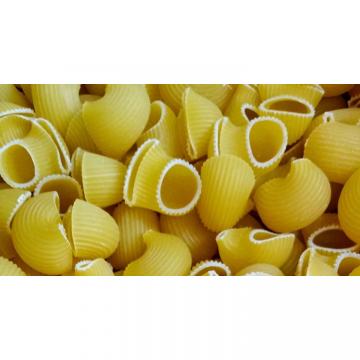

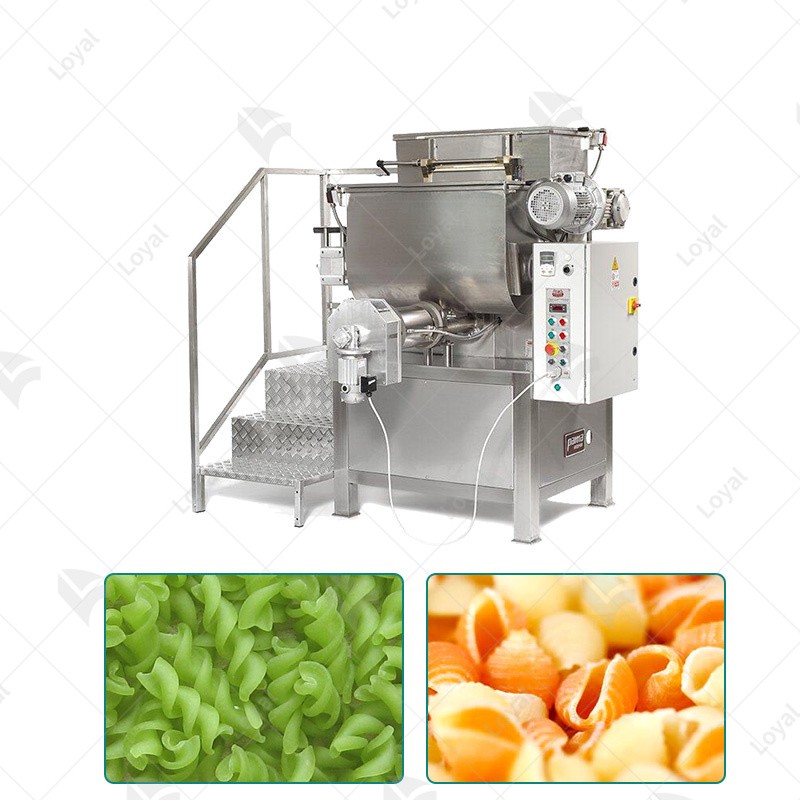

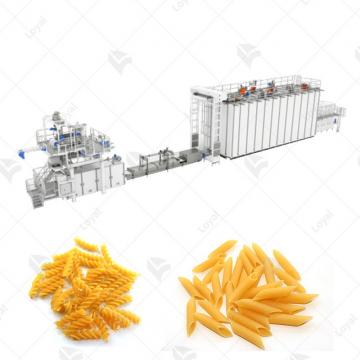
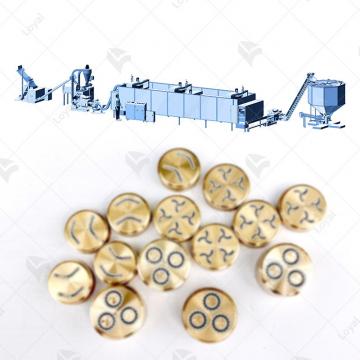 Pasta Processing Equipment
Pasta Processing Equipment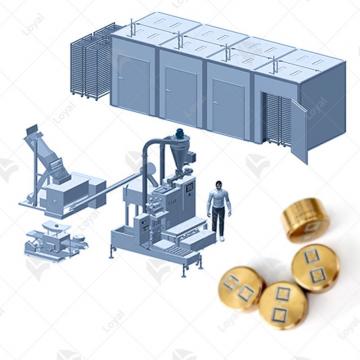 Spaghetti Pasta Production Line
Spaghetti Pasta Production Line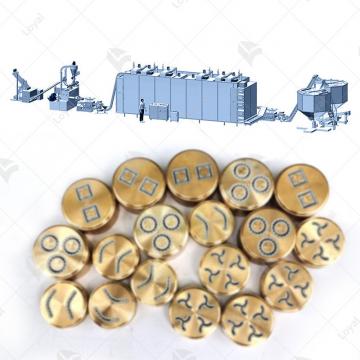 Macaroni Pasta Production Line
Macaroni Pasta Production Line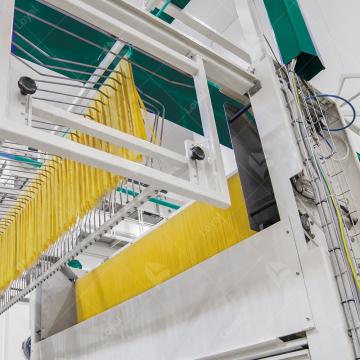 Long-Cut Pasta Production Line
Long-Cut Pasta Production Line